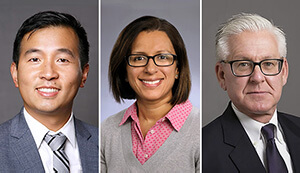Tan joins Kudchadkar, Kuzel in leading HCRN melanoma working group

Hoosier Cancer Research Network’s Melanoma Clinical Trial Working Group recently appointed a new co-chair, Alan Tan, MD, director of GU Medical Oncology and assistant professor in the Department of Internal Medicine, Division of Hematology, Oncology and Cell Therapy at Rush Medical College.
Dr. Tan (pictured left) joins current co-chairs Ragini R. Kudchadkar, MD, of Emory University and Timothy Kuzel, MD, FACP, also of Rush University, in this leadership role. His research interests are in designing and implementing novel immunotherapies and targeted therapies in melanoma and genitourinary cancers.
Prior to joining Rush University, Dr. Tan served as clinical assistant professor at the University of Arizona College of Medicine in Phoenix, where he worked on phase I, II, and III clinical trials. He received his medical degree from St. George’s University School of Medicine and completed his residency and fellowship in hematology/oncology at Saint Louis University School of Medicine.
Dr. Tan said he is eager to work with his fellow co-chairs and members to enhance the group’s portfolio of investigator-initiated studies in melanoma.
“I’m impressed with the number of people who have joined the Melanoma working group in the last year,” Dr. Tan said. “I think with a little more representation now, we’ll begin to tap into some smaller investigator-initiated trials that HCRN can do.”
Dr. Kudchadkar, an associate professor in the Department of Hematology and Medical Oncology at Emory University School of Medicine, specializes in the treatment of metastatic melanoma, Merkel cell carcinoma, basal cell carcinoma, and other cutaneous malignancies. Her research at Emory focuses on signal transduction inhibitors for the treatment of metastatic melanoma and advanced basal cell carcinomas. She earned her medical degree at Emory University School of Medicine, completed her residency in internal medicine at Emory, and her fellowship in hematology and medical oncology at the University of Colorado. She was on faculty at H. Lee Moffitt Cancer Center before moving to Emory in 2014.
Hallmarks of the HCRN working group, according to Dr. Kudchadkar, include opportunities for junior investigators to participate in multi-center studies and to receive mentorship in developing and leading their own studies.
“I think it’s a way for investigators who are not as established to get started versus competing for trials in a larger space with more seasoned investigators,” she said.
Dr. Kuzel serves as chief of the Division of Hematology, Oncology and Cell Therapy at Rush Cancer Center and as the Samuel G Taylor III MD Professor of Oncology at Rush Medical College. He is a graduate of University of Michigan Medical School. He completed his residency in internal medicine at McGaw Medical Center, Northwestern University, and his fellowship in hematology at Northwestern Memorial Hospital.
Prior to joining Rush University, Dr. Kuzel served as a professor of medicine and dermatology at the Northwestern University Feinberg School of Medicine and director of the GU and Cutaneous Oncology Programs at the Robert H. Lurie Comprehensive Cancer Center of Northwestern University. His research interests are in genitourinary malignancies and melanoma, with a particular focus on immunotherapies. He has authored and co-authored more than 250 journal articles, editorials, and book chapters, and has participated in many national, regional, and local committees.
Dr. Kuzel and his co-chairs share a common vision and goal for developing early-phase multi-center investigator-initiated studies in a variety of melanoma types and other cutaneous malignancies.
“HCRN is well positioned to do some of the smaller phase Ib, phase II, and randomized phase II clinical trials in these areas,” he said.
Dr. Kudchadkar agreed and said some of rarer cancer types and those resistant to existing therapies are of particular interest.
“The refractory population in general is a good source for studies,” Dr. Kudchadkar said. “We are also interested in exploring rare forms of melanoma – such as mucosal and uveal – where we have not made nearly as much progress as other types of melanoma.”
Dr. Tan said he is currently developing concepts for the group’s consideration and hopes these will present new opportunities for collaboration within the working group.
“We hope to involve some of our younger investigators on these studies,” he said.
See HCRN Melanoma Clinical Trial Working Group to learn more about the working group.
If you are an investigator and would like to join an HCRN Clinical Trial Working Group, please complete this form and HCRN staff will follow up with you.
About Hoosier Cancer Research Network:
Hoosier Cancer Research Network (formerly known as Hoosier Oncology Group) conducts innovative cancer research in collaboration with academic and community physicians and scientists across the United States. The organization provides comprehensive clinical trial management and support, from conception through publication. Created in 1984 as a program of the Walther Cancer Institute, Hoosier Cancer Research Network became an independent nonprofit clinical research organization in 2007. Since its founding, Hoosier Cancer Research Network has conducted more than 230 trials in a variety of cancer types and supportive care, resulting in more than 350 publications. More than 9,000 subjects have participated in Hoosier Cancer Research Network clinical trials.

Facebook
Hoosier Cancer Research Network on Facebook
Linked In
You Tube
Twitter